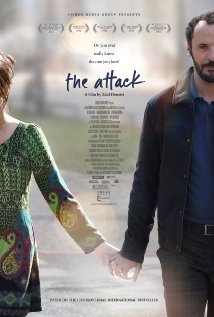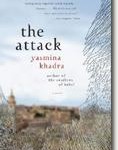
The Attack ****
It’s difficult to review a film after one has read the book first.
Or maybe it’s more accurate to say that I have a hard time doing so.
Know that my prejudice is that most often a book is better than a movie taken from the book. I can’t think of more than a handful of movies that I thought were equal to or better than the book.
Probably reading a book first significantly changes how one experiences the film. Not only does one know how the book presented its story and its outcome, but the viewer is also constantly comparing the two, rather than approaching the movie with an open mind.
Thus, my conundrum in discussing Ziad Doueiri’s film, The Attack.
 I read the novel by Yasmina Khadra (Mohammed Moulessehoul) a year or so ago and wrote briefly and positively about it it on MillersTime (see my mini-review of the book).
I read the novel by Yasmina Khadra (Mohammed Moulessehoul) a year or so ago and wrote briefly and positively about it it on MillersTime (see my mini-review of the book).
An Arab-Israeli doctor (Amin) in Tel Avi has his world turned upside down when a suicide bomber turns out to be his wife.
An improbable story?
Probably.
Nevertheless, with a bit of “willing suspension of disbelief,” this film has enough important aspects to make it worthy of your consideration.
First, this is the story of Amin and his struggle to understand how and why he has been betrayed by his wife and what role he might have played in that betrayal. But equally important is the portrayal of how both the Palestinians and the Israelis are locked into a vicious cycle from which they seem unable to extricate themselves.
About the former (Amin’s story), the film is involving and keeps the viewer engaged.
Equally, the film seeks to present a fair picture of both sides of the seemingly insolvable problem in this troubled land and is somewhat successful in doing so.
Much of the film is faithful to the book, but, for me, the book was much more powerful.
And I don’t think that is because I read it first (and reread it after seeing the film).
Some of the most intense, most memorable aspects of the book, including the ending, do not appear in the film.
Still, and especially if one has not read the book, the film deserves to be seen.
The book, even more so, deserves to be read.


Nancy Cedar Wilson said:
I have not read the book, but did see the film awhile ago, and found it full of unmitigated tragedy–
The painful dilemma that the doctor faced; understanding how his beloved wife could have betrayed him and their mutuality so fully–following so closely upon his candid revelation, in the aftermath of one of his tougher days at the hospital, where he reviled the idea of a suicide bomber who would target children–and then his discovery when he traveled back to Nablus to further investigate how she must have been brainwashed by some radical Islamists, he discovered that she was being lauded as a “Hero” in Palestinian territory. And his revulsion at that discovery–it was all terribly sad and complicated–
A thought-provoking film–too bad the Arab nations have banned it–I felt that the portrayal of the secondary characters in the film seemed to be fairly even-handed (i.e. there were good guys/bad guys on both sides of the issue)
Elizabeth said:
Loved the book!
Bill Plitt said:
Kay and I went to see “The Attack” on Wed. night at The Shirlington. I was curious about how the book’s
story might have unfolded in the movie. I shared some of your skepticism about whether movies
can match the novel. The film’s portrayal of the romantic relationship between the
the husband and wife was more emphasized, than I remember in Moulessehoul’s book. That was the first clue to the answer to my question.
The biggest disappointment in the film for me was the absence of the scene in the book where
Amin, is kidnapped in Jenin and treated harshly for several days, and then suddenly freed. His captor,
an Arab nationalist, confronts Amin and says something like “It was not the physical conditions I wanted
you to remember from your experience in the cell, nor the interrogation, but the EMBARRASSMENT, the human indignity you experienced,
because as Palestinians, that is what we experience every day.” (or something like that). Now to his credit,
Director, Zaid Doueriri, did show clips of the “wall”, the checkpoint, the capture and intimidation of a young Arab
by an IDF soldier, and the starkness of the Palestinian, urban landscape. This did offer the audience a glimpse
of the occupation.
Some of the words used in the confrontation by the nationalist after Amin’s release, were spoken by the Sheik who had arranged
Sihan’s suicide. While startling, that exchange did not have near the impact on me of the same statement
shared in the book. On another level, I don’t remember Adel, Amin’s nephew, having as much of the role
in the story as he did in the movie. It seemed that he was the seducer of his aunt, who had caused her to bankroll
the resistance movement, and finally surrender her life.
In all, I appreciated the director’s interpretation of the book. Perhaps by his going more subtle with the depiction
of life in the Occupied Territories, a path he might have actually chosen, he may actually have brought greater understanding
of the human condition to the screen than the more confrontative approach of the book. I think I might want to re-read the book
after my neighbor has finished it.
Kay by way, liked the movie, as it was captivating, but at the same time, felt the story got mired in the character development at times. The up close cinematography was
effective. I recommend at least seeing the movie. The book was superb.
Best, BiLL